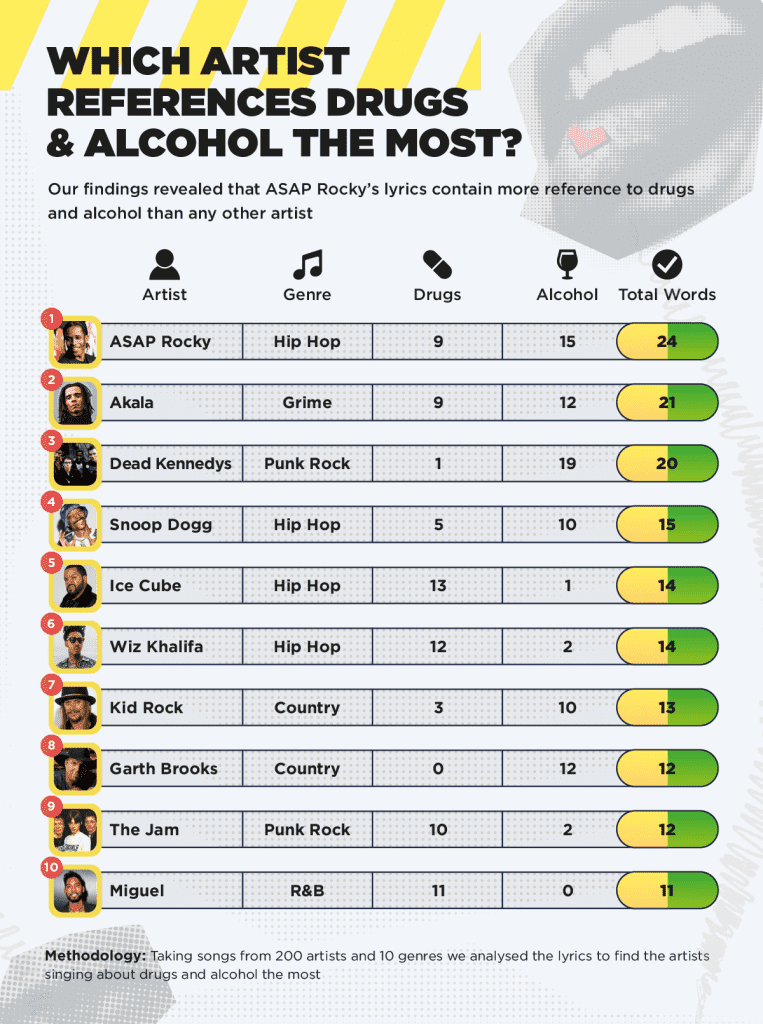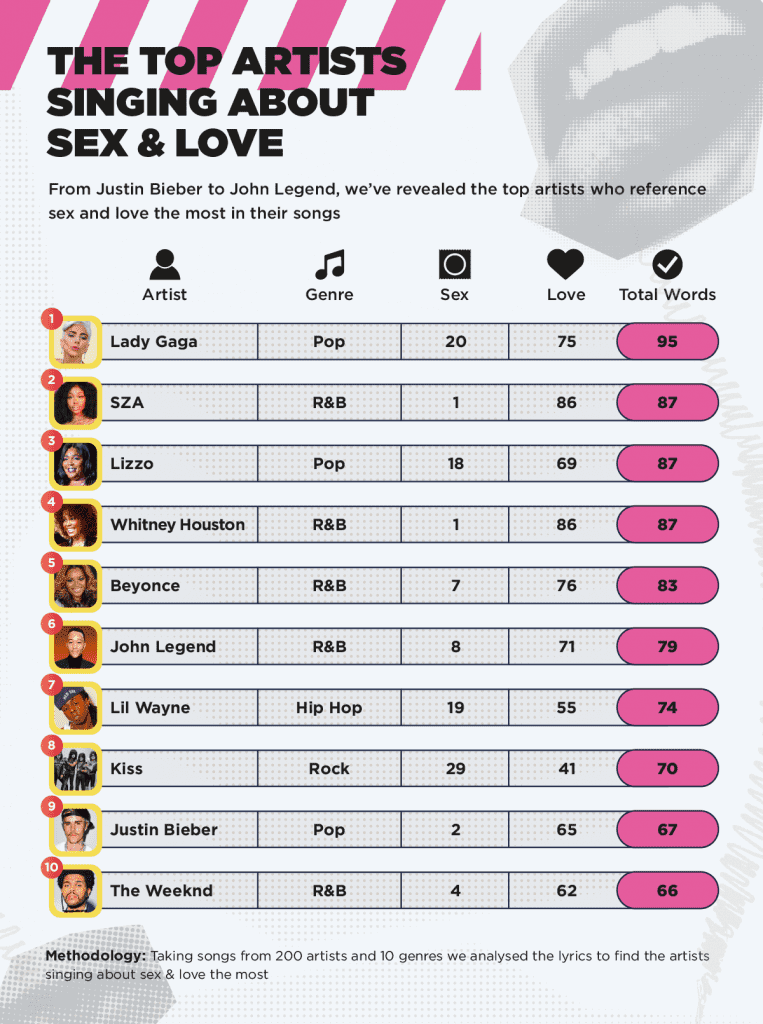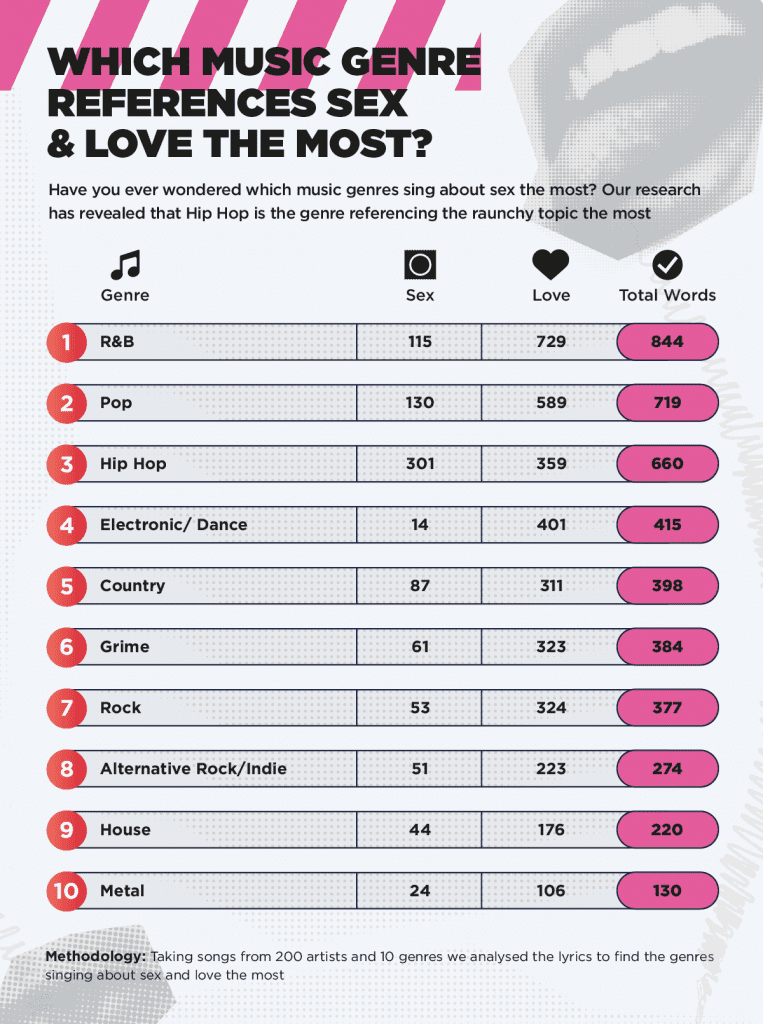The adage of ‘Sex, drugs and rock ‘n’ roll’ was coined over fifty years ago – but does the saying still ring true today?
Drug and music culture have long overlapped, and drug strewn lyrics and references in music could be heard as far back as the 1930s. Jazz, bluegrass and swing musicians would casually allude to drinking and drug use from time to time. References became more prevalent in the swinging sixties when pop stars, folksters and rock bands would sing about cocaine, heroin, marijuana and other psychoactive drugs.
Since that time, many famous artists have vocalised their ups and downs with cocaine, marijuana and hallucinogens, from Rick James with “Mary Jane” to Jefferson Airplane “White Lines”. The illicit nature of drugs has always made them a hot commodity with music.
Music’s history is deeply intertwined with sex; from “What’s Your Fantasy” and “Birthday Sex” to “Feeling Myself” and “Side to Side”, there’s a bottomless supply of popular music about sex, love and relationships. If you examine the lyrics, it becomes abundantly clear that a lot of songs contain sexual references. In fact, according to Lyrics.com, the word ‘sex’ has been referenced in musical lyrics over 15,000 times across the world.
If you were to guess which genre of music contained the most taboo references, which would it be? Researchers at Delamere have tracked the top artists and genres to find out who is sharing their vices the most within their lyrics.
Which Lyrical Genius References Alcohol and Drugs the most?
From analyzing 2000 songs from 200 artists our findings have discovered which popular music artists allude to drinking and drug use within their lyrics the most.
Harlem rapper, A$AP Rocky, frequently references drug use throughout his songs, so it comes as no surprise that he secured the top spot. His second studio album ‘At.Long.Last.A$AP’ mentions drugs within 89% of its tracks, that’s 16 out of 18 songs.
According to ASAP Rocky the album’s hit single ‘L$D’, stands for ‘Love, sex, dreams’, whereas we know it to be as the abbreviation for the drug called Lysergic acid diethylamide.

Loved Up and Lustful Singers
Lady Gaga bounded onto the music scene over a decade ago now, making headlines for her provocative lyrics, strong vocal talents and flamboyant costumes (who can forget that meat dress at the 2010 VMA’s).
Her song titles say it all, with ‘Sexxx Dreams’, ‘I Like It Rough’ and ‘Jewels N’ Drugs’ to name a few. Notably, the hit single ‘Poker Face’ is laced with gambling, and subtle, yet explicit sexual meanings throughout. Our findings revealed that the American singer-songwriter topped the list, with a total of 95 words referencing sex and love within her lyrics.
The top 10 probably looks exactly how you expected it, with other artists featured being Lizzo, Beyonce, John Legend and The Weeknd. However, legendary rock band Kiss placed number eight on the list, the only group from the genre to land in the top 20.

Drug Infused Genres
Hip-Hop topped the list for the most drug-infused genre – both the glamorisation and condemnation of drug and alcohol use have been a prevalent subculture in the genre for decades. Out of 200 Hip-Hop songs analysed, 131 contained references to drugs and alcohol.
Taking third place is Country music. This genre is well known for its love of whiskey, the liquor was mentioned 42 times over 200 songs, whilst it might not seem like a lot, it’s still much higher than every other genre within the study.
Surprisingly, Rock found itself in 9th place – despite the famous phrase ‘sex, drugs and rock & roll’.

Passionate Genres
No genre is immune to a good, old fashioned love song – even metal apparently, which has references to love and sex in 50% of songs analysed.
R&B unsurprisingly took the top spot, especially with big names such as Beyonce and John Legend being kingpins of the genre. Out of 200 songs R&B songs analyzed, sex and love were mentioned over 800 times.
Other leading genres include Pop music which formed during the mid-1950s in the United States and the United Kingdom. The musical genre, which includes Justin Bieber, Lizzo and Lady Gaga, contained 719 references within lyrics.

Our research shows that musicians often wear their heart on their sleeves. Whilst most songs’ meanings might seem obvious, many artists remain elusive in the lyrics, only to later reveal the true message behind the song. Remember ‘Can’t Feel My Face’ by The Weeknd? The singer, who’s well known for the transparency in his lyrics, caused a little bit of confusion when the song dropped…that was until people discovered the song was about cocaine use.
It’s no secret that music can influence our actions and emotions – so how do lyrics about drug and alcohol affect those suffering from addiction? One study, which looked at participants in the age range of 15-25 found that listening namely to rap, reggae and techno positively contributed to alcohol and drug use.
The Role of Music Within Addiction Recovery
Music is good for your soul and your mental health. Music therapy is an age-old technique and has been used to help combat a variety of issues, from stress relief, to even helping with improving cognitive function or addiction therapy. Music therapy can be used to treat those with substance abuse disorders to increase mood, provide emotional relief and help fight cravings and stress.
The role of music therapy within addiction recovery when used alongside other rehabilitation techniques can help by:
- Stabilize emotions
- Preventing boredom, a common trigger during recovery
- Improving concentration
- Managing Stress
- Easing people into the practice of meditation, a technique that is known for helping recovery
- Combating depression and anxiety, common disorders that are long associated with addiction
Does the inclusion of drugs, alcohol and sex within lyrics trigger those suffering from addiction?
According to Martin Preston Founder & Chief Executive at Delamere Health, for someone who struggles or has struggled with alcohol or substances, music can anchor them to their early days when alcohol or drugs weren’t problematic. Music that takes someone to the very start of their relationship with alcohol or drugs can be triggering in the extreme: it can conjure memories of when their drug of choice seemed to work – or at least didn’t make their lives unmanageable. The danger here is that euphoric recall and then denial can creep back in. The notion of maybe I could drink in moderation is a dangerous one for someone in recovery.
“Music certainly can be a trigger. We all know that the songs we listened to growing up can transport us back to our youth. I just need to hear anything by Oasis, for instance, and it evokes powerful memories of long summer school holidays, my circle of friends at that point in my life and even how I felt about the world.”
Martin Preston
Does the music industry have a responsibility to reduce the use of taboo references within lyrics?
Founder & Chief Executive, Martin Preston at Delamere Health says:
The music industry, in many ways, glamorizes and glorifies drug and alcohol use. Substance abuse is something that is made evident through the music and documented social behaviours of famous singers, rappers and other individuals in the music industry.
Drugs, alcohol and sex within lyrics is something that can be influential on the behaviour of children and teenagers. Just like adults, they begin to relate to the artists and situations in personal ways. Music artists who openly promote drug and alcohol use should take into consideration the severity of their influence on their fans.
It is easy to forget the real-world consequences of our actions when the music industry fails to highlight the problematic outcomes that drugs, alcohol and sex can have. It is reasonable to believe that decreased exposure to substance abuse in the music industry or within artist representation can have a positive effect on the drug and alcohol-related behaviours of the millions of consumers of the entertainment industry.
How can you spot and prevent addiction
The key component to preventing addiction is spotting the symptoms ahead of time. Having someone that will help you recognise and these symptoms are very beneficial.
Spotting that you have a problem is the first step to resolving it, once you recognise that you are being negatively affected you can start to find the root of the problem and devise a plan to stop it.
Speaking to someone is incredibly important, whether it is your partner, a friend or a professional, talking about the problem will help significantly.






